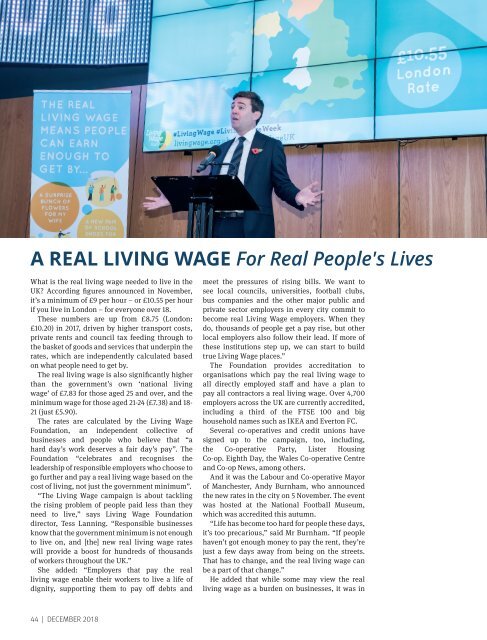DECEMBER 2018
The December edition of Co-op News: connecting, challenging and championing the global co-operative movement. This issue we look at the issue of engagement, and the co-operative way of making connections. Plus coverage of the 2018 Practitioners Forum, new Real Living Wage rates and member-nominated director (MND) elections at the Co-op Group.
The December edition of Co-op News: connecting, challenging and championing the global co-operative movement. This issue we look at the issue of engagement, and the co-operative way of making connections. Plus coverage of the 2018 Practitioners Forum, new Real Living Wage rates and member-nominated director (MND) elections at the Co-op Group.
Create successful ePaper yourself
Turn your PDF publications into a flip-book with our unique Google optimized e-Paper software.
A REAL LIVING WAGE For Real People's Lives<br />
What is the real living wage needed to live in the<br />
UK? According figures announced in November,<br />
it’s a minimum of £9 per hour – or £10.55 per hour<br />
if you live in London – for everyone over 18.<br />
These numbers are up from £8.75 (London:<br />
£10.20) in 2017, driven by higher transport costs,<br />
private rents and council tax feeding through to<br />
the basket of goods and services that underpin the<br />
rates, which are independently calculated based<br />
on what people need to get by.<br />
The real living wage is also significantly higher<br />
than the government’s own ‘national living<br />
wage’ of £7.83 for those aged 25 and over, and the<br />
minimum wage for those aged 21-24 (£7.38) and 18-<br />
21 (just £5.90).<br />
The rates are calculated by the Living Wage<br />
Foundation, an independent collective of<br />
businesses and people who believe that “a<br />
hard day’s work deserves a fair day’s pay”. The<br />
Foundation “celebrates and recognises the<br />
leadership of responsible employers who choose to<br />
go further and pay a real living wage based on the<br />
cost of living, not just the government minimum”.<br />
“The Living Wage campaign is about tackling<br />
the rising problem of people paid less than they<br />
need to live,” says Living Wage Foundation<br />
director, Tess Lanning. “Responsible businesses<br />
know that the government minimum is not enough<br />
to live on, and [the] new real living wage rates<br />
will provide a boost for hundreds of thousands<br />
of workers throughout the UK.”<br />
She added: “Employers that pay the real<br />
living wage enable their workers to live a life of<br />
dignity, supporting them to pay off debts and<br />
meet the pressures of rising bills. We want to<br />
see local councils, universities, football clubs,<br />
bus companies and the other major public and<br />
private sector employers in every city commit to<br />
become real Living Wage employers. When they<br />
do, thousands of people get a pay rise, but other<br />
local employers also follow their lead. If more of<br />
these institutions step up, we can start to build<br />
true Living Wage places.”<br />
The Foundation provides accreditation to<br />
organisations which pay the real living wage to<br />
all directly employed staff and have a plan to<br />
pay all contractors a real living wage. Over 4,700<br />
employers across the UK are currently accredited,<br />
including a third of the FTSE 100 and big<br />
household names such as IKEA and Everton FC.<br />
Several co-operatives and credit unions have<br />
signed up to the campaign, too, including,<br />
the Co-operative Party, Lister Housing<br />
Co-op. Eighth Day, the Wales Co-operative Centre<br />
and Co-op News, among others.<br />
And it was the Labour and Co-operative Mayor<br />
of Manchester, Andy Burnham, who announced<br />
the new rates in the city on 5 November. The event<br />
was hosted at the National Football Museum,<br />
which was accredited this autumn.<br />
“Life has become too hard for people these days,<br />
it’s too precarious,” said Mr Burnham. “If people<br />
haven’t got enough money to pay the rent, they’re<br />
just a few days away from being on the streets.<br />
That has to change, and the real living wage can<br />
be a part of that change.”<br />
He added that while some may view the real<br />
living wage as a burden on businesses, it was in<br />
44 | <strong>DECEMBER</strong> <strong>2018</strong>


















